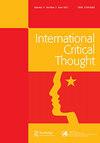Seeking the “Spirit of Capitalism”: The German Historical School and the Controversies about the Origins of Capitalism
IF 0.4
Q4 POLITICAL SCIENCE
引用次数: 1
Abstract
ABSTRACT The question of the origins or genesis of capitalism preoccupied the writers of the so-called German Historical School and led to fierce disputes between them in the first three decades of the twentieth century. Its “background” was Marx's theory of capitalism and its genesis in Capital, against which the authors under consideration attempted to formulate an alternative historical analysis and theory. The leading figure of the school at the time, Werner Sombart, introduced the notion of the “spirit of capitalism” as an independent, decisive factor in the birth of the capitalist system, which pre-existed capitalism. The birth of capitalism took place, according to Sombart, when the activities of certain economic subjects who owned large amounts of money merged with the activities of other economic subjects already possessing a certain economic spirit, which proved to be pertinent to capitalism. The idea of a pre-existing “spirit” which enabled the genesis of capitalism was later adopted by Max Weber who radically modified Sombart's reasoning in a direction compatible with Nassau William Senior's theory of abstinence. Despite its poor documentation of historical facts and social theory, Weber's approach still fascinates certain social scientists, probably because it is being perceived as constituting an “anti-Marxist Manifesto.”寻找“资本主义精神”:德国历史学派与资本主义起源之争
资本主义的起源问题一直困扰着所谓的德国历史学派的作者,并在20世纪头30年引发了他们之间的激烈争论。它的“背景”是马克思的资本主义理论及其在《资本论》中的起源,本文作者试图以此为背景,形成一种另类的历史分析和理论。当时该学派的领军人物维尔纳·桑巴特(Werner Sombart)介绍了“资本主义精神”的概念,认为资本主义制度的诞生是一个独立的、决定性的因素,而资本主义制度先于资本主义存在。根据桑巴特的说法,资本主义的诞生发生在某些拥有大量货币的经济主体的活动与其他已经拥有某种经济精神的经济主体的活动相结合的时候,这被证明与资本主义有关。一种预先存在的“精神”促成了资本主义的起源,这一观点后来被马克斯·韦伯采纳,他从根本上修改了桑巴特的推理,使之与拿骚·威廉·西尼尔的禁欲理论相一致。尽管韦伯的方法对历史事实和社会理论的记录很差,但它仍然吸引着某些社会科学家,可能是因为它被视为构成了“反马克思主义宣言”。
本文章由计算机程序翻译,如有差异,请以英文原文为准。
求助全文
约1分钟内获得全文
求助全文

 求助内容:
求助内容: 应助结果提醒方式:
应助结果提醒方式:


